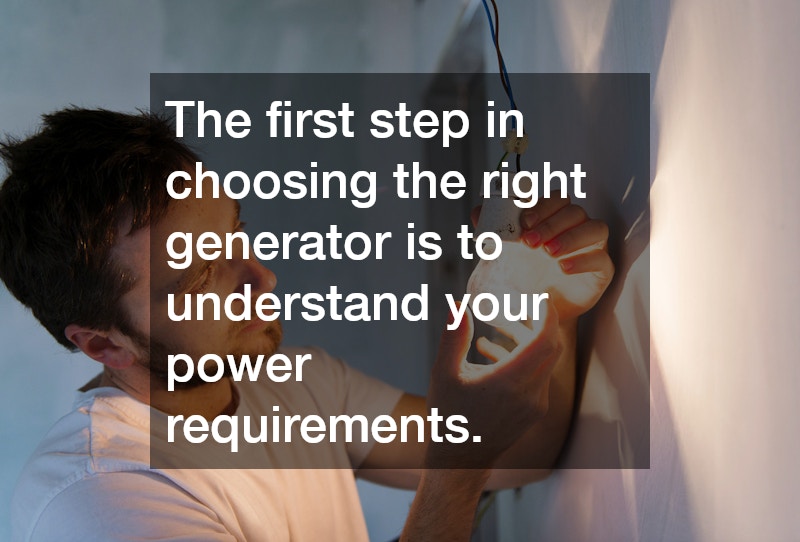Choosing the right generator is essential for ensuring you have the power you need, whether for an outdoor event, construction site, or emergency backup. With so many options available, it can be challenging to know which type of generator is best suited to your needs. If you’re considering generator hire in Norwich, this guide will help you identify the key factors to consider when selecting the right generator for your project.
Understanding Your Power Needs
The first step in choosing the right generator is to understand your power requirements. Generators come in various sizes and power capacities, and selecting one that can handle your specific energy needs is crucial.
The power output of a generator is measured in watts, and different appliances, tools, and equipment require varying amounts of power to operate effectively.
For instance, smaller appliances such as lights, laptops, or portable speakers require minimal power, while heavy-duty equipment like construction tools, air conditioners, or heaters will need a more powerful generator. When renting a generator, make a list of all the items you plan to power and calculate their wattage requirements. This will help you choose a generator with the appropriate power capacity to ensure a seamless operation.
Types of Generators Available for Hire
When looking for generator hire in Norwich, you’ll encounter a variety of generator types, each designed for specific purposes. The most common types of generators available for hire include portable generators, standby generators, and inverter generators.
Portable generators are the most versatile and commonly used for events, outdoor activities, and smaller construction sites. They are easy to transport, making them ideal for temporary power needs. Most portable generators run on petrol or diesel, and they offer enough power to run essential appliances and equipment. If you’re hosting an outdoor event or need power for a temporary project, a portable generator might be the right choice for you.
Standby generators, on the other hand, are more powerful and are often used for industrial purposes or large-scale events. These generators are typically installed at a fixed location and automatically turn on during a power outage. While they are larger and more expensive than portable options, standby generators offer a reliable and uninterrupted power supply, making them ideal for critical operations like hospitals, construction sites, or large event venues.
Inverter generators are another option, known for their efficiency and quiet operation. They are smaller, lighter, and produce cleaner power, which makes them ideal for powering sensitive electronics such as laptops, cameras, and mobile phones. If noise levels are a concern, or if you need to power delicate equipment, an inverter generator could be the best fit.
Consider the Duration of Use
Another important factor when choosing a generator is how long you need to use it. If you’re renting a generator for a short-term project or a one-day event, a portable or inverter generator may be sufficient. These types of generators are designed for temporary use and can be easily transported to and from your location.
However, if you’re dealing with a long-term project, such as a construction site, or you’re preparing for extended power outages, a more robust standby generator might be necessary. Standby generators are built to run for extended periods, ensuring continuous power without frequent refueling or maintenance. Before renting, consider how long you’ll need the generator and choose one that can meet your needs without interruption.
Fuel Type and Efficiency
When hiring a generator, it’s also important to consider the type of fuel it uses. Most generators run on petrol, diesel, or natural gas, and the fuel type can affect both the efficiency and environmental impact of the generator.
Petrol generators are typically more affordable and are a popular choice for smaller, portable models. However, petrol can be less fuel-efficient than diesel, which is why many larger generators, such as standby units, run on diesel. Diesel generators are known for their fuel efficiency and durability, making them ideal for heavy-duty use or extended run times. If you need a generator for a longer period or for a high-demand job, a diesel generator may offer better performance and savings in the long run.
Natural gas generators are also available, although they are less common for generator hire. They are environmentally friendly and can be more cost-effective if you have access to a natural gas supply.
Noise Levels and Location
Finally, consider the location where you’ll be using the generator. Generators can vary significantly in terms of noise levels, and this can be an important factor depending on the environment. For outdoor events, residential areas, or places where noise regulations apply, a quiet inverter generator might be your best option. In contrast, construction sites or industrial areas may not have the same noise restrictions, making a louder portable or standby generator more suitable.
Final Thoughts
Choosing the right generator for your needs depends on several factors, including power requirements, duration of use, fuel type, and noise levels. Whether you need a portable generator for a small event or a standby generator for a large-scale project, generator hire in Norwich offers flexible and cost-effective solutions for a range of power needs. By understanding the different types of generators available and matching them to your specific requirements, you can ensure you have the right equipment to keep your project or event running smoothly.
.

